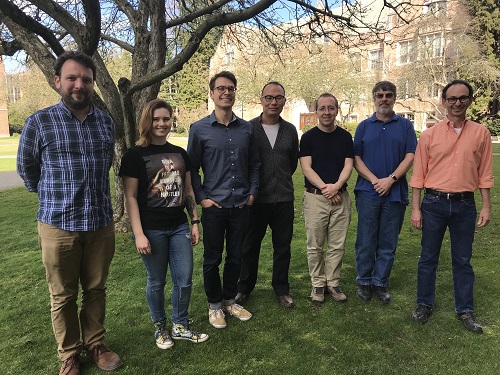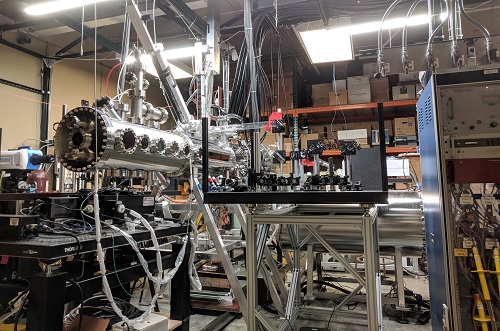FuZE Lab, UW Department of Aeronautics & Astronautics
April 5, 2019

The paper's A&A authors (L-R): Anton Stepanov, Ellie Forbes, Elliot Claveau, Yue Zhang, Toby Weber, Brian Nelson, and Uri Shumlak.
Nuclear fusion powers the stars and offers the promise of unlimited, clean energy on Earth. But controlled thermonuclear fusion in the lab usually requires large and expensive magnetic field coils to stably confine burning plasma, ionized nuclei that collide to initiate nuclear fusion. A&A's Fusion Z-Pinch Experiments (FuZE) Lab has demonstrated a smaller, cheaper method: We have measured sustained nuclear fusion for the first time from a 50-cm long plasma column called a Z-pinch. This method compresses a flowing plasma using electromagnetic forces, which drive the plasma to higher temperatures and densities.
While the Z-pinch is not a new plasma confinement concept, it was largely abandoned as a path for fusion energy because the plasma was not stable, which limited how long it could be confined. To get around this issue, we exploited the fact that flows can stabilize plasma, and our flowing plasma was maintained five thousand times longer than a static plasma. We also observed the sustained release of telltale energetic neutrons signaling nuclear fusion. Because this approach provides a path to nuclear fusion without coils, it could be used in the future for long-duration fusion burns in a compact and low-cost device.

The Z-pinch in A&A's FuZE Lab.
Our paper, Sustained Neutron Production from a Sheared-Flow Stabilized Z Pinch, has been published in Physical Review Letters.
Katherine Wright, Senior Editor of Physics, published a summary of the paper: Synopsis: Igniting Fusion in the Lab.
Nick Lavars of New Atlas covers this research in Nuclear fusion breakthrough breathes life into the overlooked Z-pinch approach.
The Flow Z-Pinch Lab has a new website and url. Visit it at https://sites.uw.edu/zpinchlab/.